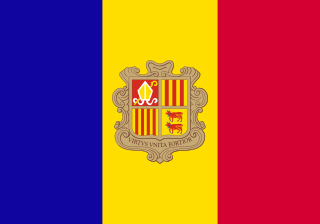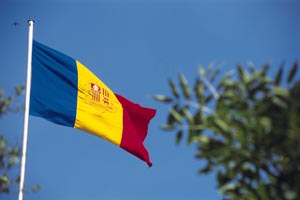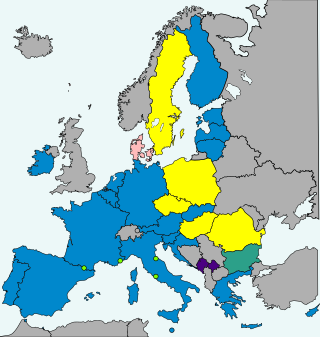Related Research Articles

Andorra, officially the Principality of Andorra, is a sovereign landlocked country on the Iberian Peninsula, in the eastern Pyrenees, bordered by France to the north and Spain to the south. Believed to have been created by Charlemagne, Andorra was ruled by the count of Urgell until 988, when it was transferred to the Roman Catholic Diocese of Urgell. The present principality was formed by a charter in 1278. It is currently headed by two co-princes: the bishop of Urgell in Catalonia, Spain and the president of France. Its capital and largest city is Andorra la Vella.
Andorra, officially the Principality of Andorra, also called the Principality of the Valleys of Andorra, is a sovereign landlocked microstate in Southwestern Europe, located in the eastern Pyrenees mountains and bordered by Spain and France.

Andorra is a small, landlocked country in southwestern Europe, located in the eastern Pyrenees mountain range and bordered by Spain and France. With an area of 468 km², it is the sixth smallest country in Europe and also the largest of the European microstates.

"El gran Carlemany" is the national anthem of the Principality of Andorra. Enric Marfany Bons composed the music, while the lyrics were authored by Joan Benlloch i Vivó, written in a first-person narrative from the point of view of Andorra. It was adopted as the national anthem on 8 September 1921, which is also the national day of Andorra. The lyrics make reference to several key aspects of Andorran culture and history, such as the heritage of the Carolingian Empire.
Andorra is essentially Catalan speaking. The country has contributed significantly to the Catalan heritage.

Canillo is one of the parishes of Andorra. Canillo is also the name of the main town of the parish. The parish is considered the religious center of Andorra with the Sanctuary and Chapel of Our Lady of Meritxell, patron saint of Andorra, and contains one of the best-preserved romanesque churches in the Pyrenees, Sant Joan de Caselles. It has a population of 4,826, as of 2011. Despite having a tourist vocation, the parish of Canillo still retains many livestock and agricultural traits.

Ordino is the most northerly parish in the Principality of Andorra. It's mostly the main area of Valira del Nord or Valira d'Ordino river valley. Ordino is also the name of the main town of the parish. Other settlements in the parish are El Serrat, Ansalonga, Sornàs, La Cortinada, Llorts, Segudet, Arans, Les Salines and Arcalís. It is home to the Sorteny National Park, the largest nature area of Andorra. It has a population of 4,858, as of 2017. The town preserves a vast medieval center, mainly linked to the culture of the country.

Òscar Ribas Reig was an Andorran politician, lawyer, and businessman who became the prime minister of Andorra in 1982. He twice served as head of government, first from 8 January 1982 to 21 May 1984 and again from 12 January 1990 to 7 December 1994.

The Andorra National Library was founded in 1930, then re-opened in 1974. Since 2020, it is housed in the former Hotel Rosaleda in Encamp.

The sac de gemecs is a type of bagpipe found in Catalonia.
Same-sex marriage has been legal in Andorra since 17 February 2023. Andorra first established stable unions on 23 March 2005, providing same-sex couples with some of the rights and benefits of marriage, and later enacted civil unions on 25 December 2014, offering a greater set of rights. On 21 July 2022, the General Council voted to open civil marriage to same-sex couples. The law was promulgated by Co-Prince Emmanuel Macron on 17 August 2022, and came into effect six months later. Andorra was the 34th country in the world and the nineteenth in Europe to allow same-sex couples to marry.

Antoni Martí Petit was an Andorran architect and politician who served as the prime minister of Andorra between 2011 and 2019, when he was elected on the ticket of the Democrats for Andorra.

Andorra has a monetary agreement with the EU allowing it to make the euro its official currency, and permitting it to issue euro coins from 1 July 2013. They planned to issue their first coins by March or April 2014. On 23 December 2014, coins were delivered for pre-booked customers at the Government Administration Building, and actual circulation began on 15 January 2015.
The Cultural Heritage of Andorra is an organization in Andorra which protects national buildings and monuments considered of cultural and historical value.
The 2019 Andorran local elections were held on 15 December, to elect all councillors in the seven parishes of Andorra.
The COVID-19 pandemic in Andorra was a part of the worldwide pandemic of coronavirus disease 2019 caused by severe acute respiratory syndrome coronavirus 2. The virus was confirmed to have reached Andorra on 2 March 2020, when a 20-year-old man returned to the country from Milan, Italy. With a total population of 77,543, on 7 December 2020, the infection rate was 1 case per 11 inhabitants, and the death rate was 1 case per 994 inhabitants.
The literature of Andorra is part of Catalan literature, that is, of literature in the Catalan language. It is the literature represented by the writings created in the Principality of Andorra or by Andorran authors.

In the parliamentary elections in Andorra on 2 April 2023, the incumbent liberal-conservative coalition between Democrats for Andorra (DA) and Committed Citizens (CC) won an absolute majority led by Prime Minister Xavier Espot. This is the fourth legislature in a row in which DA governs the country. A new party, Concord, emerged in second place, taking the opposition leadership held by the Social Democratic Party since 2019, which fell to third place by losing four seats.
Local elections in Andorra were held on 17 December to elect all councillors in the seven parishes of Andorra. Voter turnerout was 54.75% dropping over 1.5% in comparison to the 2019 elections.
References
- ↑ Àlvar Valls Oliva - Roser Carol Romàn; Àlvar Valls i Oliva; Roser Carol i Romàn (15 November 2010). Llegendes d'Andorra. L'Abadia de Montserrat. pp. 95–. ISBN 978-84-9883-340-9.
- ↑ "Andorra Stamp New Issues". Joll.co.nz. Retrieved 2016-10-12.
- ↑ "L'Esbart de les Valls del Nord estrena la llegenda del buner" (in Catalan). BonDia Diari digital d'Andorra. 2012-06-14. Archived from the original on 2016-04-16. Retrieved 2016-10-12.